六年级英语下册第一单元知识归纳
新人教PEP六年级英语下册《Unit1_知识详解》
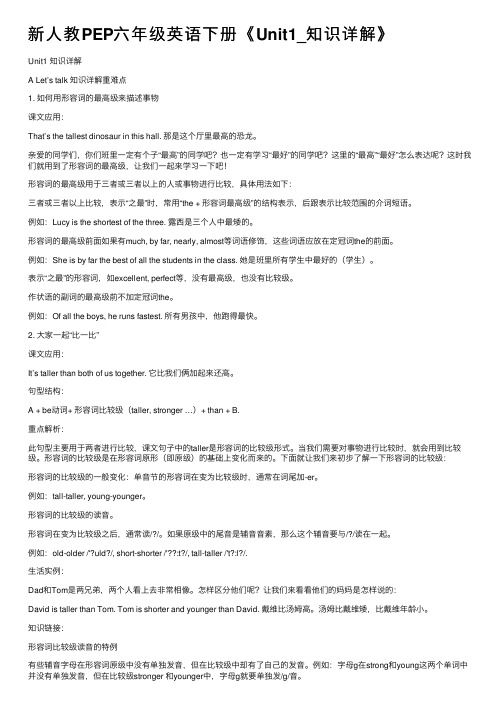
新⼈教PEP六年级英语下册《Unit1_知识详解》Unit1 知识详解A Let’s talk 知识详解重难点1. 如何⽤形容词的最⾼级来描述事物课⽂应⽤:That’s the tallest dinosaur in this hall. 那是这个厅⾥最⾼的恐龙。
亲爱的同学们,你们班⾥⼀定有个⼦“最⾼”的同学吧?也⼀定有学习“最好”的同学吧?这⾥的“最⾼”“最好”怎么表达呢?这时我们就⽤到了形容词的最⾼级,让我们⼀起来学习⼀下吧!形容词的最⾼级⽤于三者或三者以上的⼈或事物进⾏⽐较,具体⽤法如下:三者或三者以上⽐较,表⽰“之最”时,常⽤“the + 形容词最⾼级”的结构表⽰,后跟表⽰⽐较范围的介词短语。
例如:Lucy is the shortest of the three. 露西是三个⼈中最矮的。
形容词的最⾼级前⾯如果有much, by far, nearly, almost等词语修饰,这些词语应放在定冠词the的前⾯。
例如:She is by far the best of all the students in the class. 她是班⾥所有学⽣中最好的(学⽣)。
表⽰“之最”的形容词,如excellent, perfect等,没有最⾼级,也没有⽐较级。
作状语的副词的最⾼级前不加定冠词the。
例如:Of all the boys, he runs fastest. 所有男孩中,他跑得最快。
2. ⼤家⼀起“⽐⼀⽐”课⽂应⽤:It’s taller than both of us together. 它⽐我们俩加起来还⾼。
句型结构:A + be动词+ 形容词⽐较级(taller, stronger …)+ than + B.重点解析:此句型主要⽤于两者进⾏⽐较,课⽂句⼦中的taller是形容词的⽐较级形式。
当我们需要对事物进⾏⽐较时,就会⽤到⽐较级。
形容词的⽐较级是在形容词原形(即原级)的基础上变化⽽来的。
外研版一起点六年级下册Unit 1知识点汇总
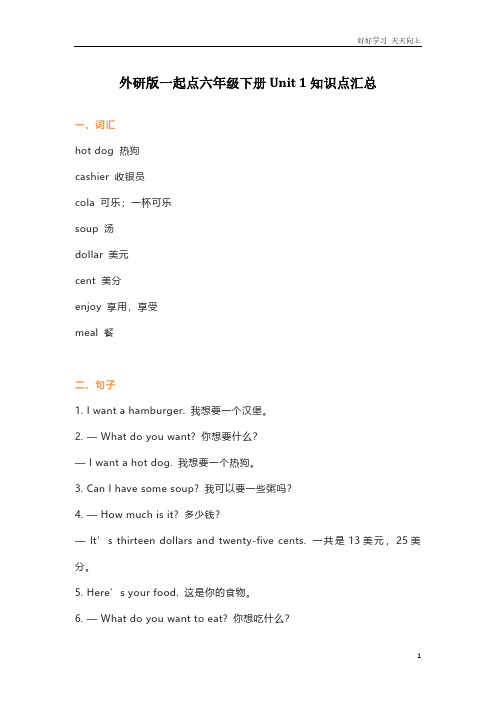
外研版一起点六年级下册Unit 1知识点汇总一、词汇hot dog 热狗cashier 收银员cola 可乐;一杯可乐soup 汤dollar 美元cent 美分enjoy 享用,享受meal 餐二、句子1. I want a hamburger. 我想要一个汉堡。
2. — What do you want? 你想要什么?— I want a hot dog. 我想要一个热狗。
3. Can I have some soup? 我可以要一些粥吗?4. — How much is it? 多少钱?— It’s thirteen dollars and twenty-five cents. 一共是13美元,25美分。
5. Here’s your food. 这是你的食物。
6. — What do you want to eat? 你想吃什么?— I want to eat some meat. 我想吃些肉。
7. Can I help you? 我可以帮你吗?8. — What do you want to drink? 你想喝什么?— Milk, please. 请来一杯牛奶。
三、句型结构1. I want + a/ an/ some... + 名词. 表示某人想要某物。
eg: I want some eggs. 我想要一些鸡蛋。
2. What do you want to eat/ drink? 询问对方想吃/ 喝什么。
eg: — What do you want to drink? 你想喝点什么?— A cup of coffee, please. 请来一杯咖啡。
3. — How much is ...? 询问某物多少钱。
— It’s ...eg: — How much is the coat? 这个外套多少钱?— It’s one hundred yuan. 一百元。
人教版六年级下册英语第一单元知识点
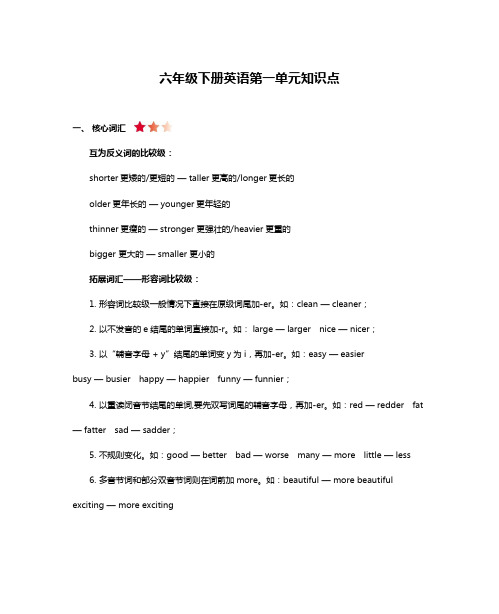
六年级下册英语第一单元知识点一、核心词汇互为反义词的比较级:shorter更矮的/更短的— taller更高的/longer更长的older更年长的— younger更年轻的thinner更瘦的— stronger更强壮的/heavier更重的bigger 更大的— smaller 更小的拓展词汇——形容词比较级:1. 形容词比较级一般情况下直接在原级词尾加-er。
如:clean — cleaner;2. 以不发音的e结尾的单词直接加-r。
如: large — larger nice — nicer;3. 以“辅音字母 + y”结尾的单词变y为i,再加-er。
如:easy — easierbusy — busier happy — happier funny — funnier;4. 以重读闭音节结尾的单词,要先双写词尾的辅音字母,再加-er。
如:red — redder fat — fatter sad — sadder;5. 不规则变化。
如:good — better bad — worse many — more little — less6. 多音节词和部分双音节词则在词前加more。
如:beautiful — more beautiful exciting — more exciting二、了解词汇dinosaur恐龙hall大厅 metre米(美式英语: meter) than比 both两个都kilogram千克;公斤countryside乡村lower(low的比较级)更低地shadow阴影;影子 smarter(smart的比较级)更聪明的 become开始变得;变成三、核心句型1. — How tall are you? 你有多高?— I'm 1.64 metres. 我身高1.64米。
2. — What size are your shoes, Mike? 迈克,你穿多大号的鞋?— Size 7. 7号。
新人教pep版六年级英语下册unit1复习总结

新人教pep版六年级英语下册unit1复习总结一、单词巩固:(写出下列形容词的比较级)一、重点句子。
1.I’m taller than this dinosaur.我比这只恐龙高。
2.Some dinosaurs are bigger than houses.Some are smaller than our schoolbags.一些恐龙比房子大。
一些比我们的书包小。
3.询问体重的问句:--How heavy is it?它体重多少?--It’s five tons.它5吨。
4.询问鞋子的尺码:--What size are your shoes?你穿多大号的鞋?--What are your shoes?你穿多大号鞋?--My shoes are size35.我穿35号的鞋。
5.询问高度:--How tall is it?它有多高?--Maybe4metres.可能4米。
--I’m1.65metres.我身高1.65米。
--Size7.7号。
6.询问体重:--How heavy are you?你体重多少?--I’m48kilograms.我体重48千克。
课堂操练:按要求完成句子。
1.I am46kilograms.(对画线部分提问)1.Ⅰwear size37in China.(对画线部分提问)2.My friend is9years old.(对画线部分提问)3.Peter is shorter than Sam.(对画线部分提问)5.I am stronger than my brother.(改为一般疑问句)三、语法专项:形容词比较级的规则变化:单音节词和少数双音节词:(1)一般在词尾加“er”。
例如:tall—taller,young younger,old一older,small smaller。
(2)以字母“e”结尾的词,加“r”。
例如:fine—finer,nice-nicer,late-later。
(完整版)人教版六年级下册英语知识点总结
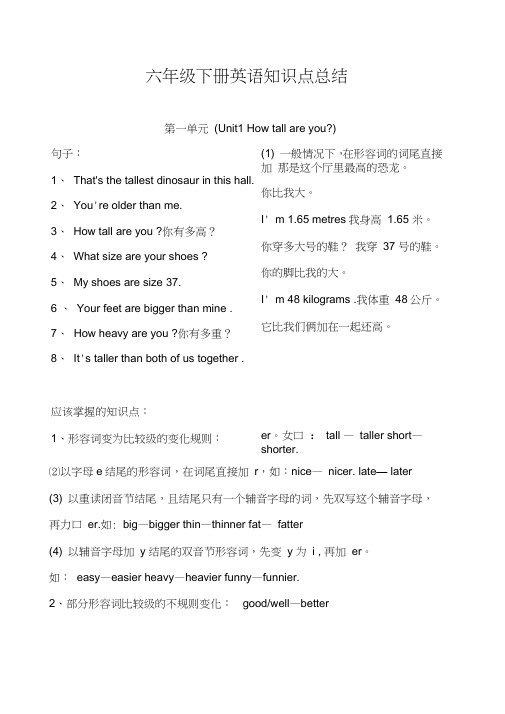
六年级下册英语知识点总结第一单元(Unit1 How tall are you?)句子:1、That's the tallest dinosaur in this hall.2、You're older than me.3、How tall are you ?你有多高?4、What size are your shoes ?5、My shoes are size 37.6 、Your feet are bigger than mine .7、How heavy are you ?你有多重?8、It's taller than both of us together .应该掌握的知识点:1、形容词变为比较级的变化规则:(1) 一般情况下,在形容词的词尾直接加那是这个厅里最高的恐龙。
你比我大。
I' m 1.65 metres我身高1.65 米。
你穿多大号的鞋?我穿37 号的鞋。
你的脚比我的大。
I' m 48 kilograms .我体重48公斤。
它比我们俩加在一起还高。
er。
女口: tall —taller short—shorter.⑵以字母e结尾的形容词,在词尾直接加r,如:nice—nicer. late— later(3) 以重读闭音节结尾,且结尾只有一个辅音字母的词,先双写这个辅音字母,再力口er.如: big—bigger thin—thinner fat—fatter(4) 以辅音字母加y 结尾的双音节形容词,先变y 为i , 再加er。
如:easy—easier heavy—heavier funny—funnier.2、部分形容词比较级的不规则变化:good/well—better3、 比较级的标志:tha n 。
弓I 导比较级的特殊疑问词: Which 。
句子结构为:Which+名词+is+形容词比较级。
比较级+and+比较级表示:越来越 ...4、 A 与 B 比较的句子结构: A+be 动词+形容词比较级 +than+B. 否定句句子结 构:A+be 动词+not+形容词比较级+than+B. —般疑问句句子结构:Be 动词+A + 形容词比较级 +than+B ?A 比B 多多少的句子结构:A+be 动词+数字+单位+形容词比较级+than+B 。
人教PEP版英语六年级下册Unit 1-4知识点总结(期末复习)
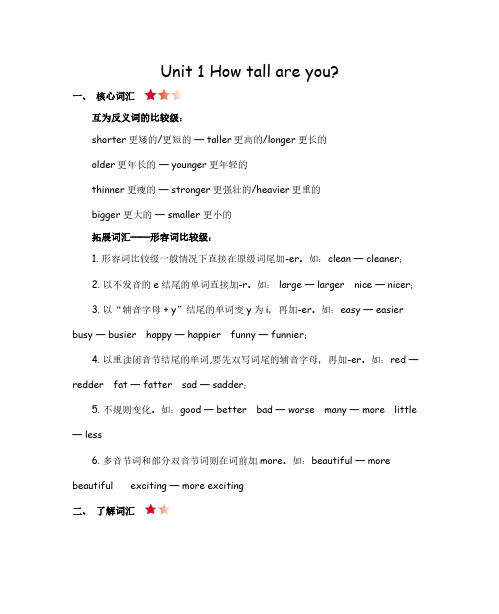
Unit1How tall are you?一、核心词汇互为反义词的比较级:shorter更矮的/更短的—taller更高的/longer更长的older更年长的—younger更年轻的thinner更瘦的—stronger更强壮的/heavier更重的bigger更大的—smaller更小的拓展词汇——形容词比较级:1.形容词比较级一般情况下直接在原级词尾加-er。
如:clean—cleaner;2.以不发音的e结尾的单词直接加-r。
如:large—larger nice—nicer;3.以“辅音字母+y”结尾的单词变y为i,再加-er。
如:easy—easier busy—busier happy—happier funny—funnier;4.以重读闭音节结尾的单词,要先双写词尾的辅音字母,再加-er。
如:red—redder fat—fatter sad—sadder;5.不规则变化。
如:good—better bad—worse many—more little —less6.多音节词和部分双音节词则在词前加more。
如:beautiful—more beautiful exciting—more exciting二、了解词汇dinosaur恐龙hall大厅metre米(美式英语:meter)than比both两个都kilogram千克;公斤countryside乡村lower(low的比较级)更低地shadow阴影;影子smarter(smart的比较级)更聪明的become开始变得;变成三、核心句型1.—How tall are you?你有多高?—I’m1.64metres.我身高1.64米。
2.—What size are your shoes,Mike?迈克,你穿多大号的鞋?—Size7.7号。
3.—How heavy are you?你体重多少?—I’m48kilograms.我体重48公斤。
六年级下册unit 1知识点
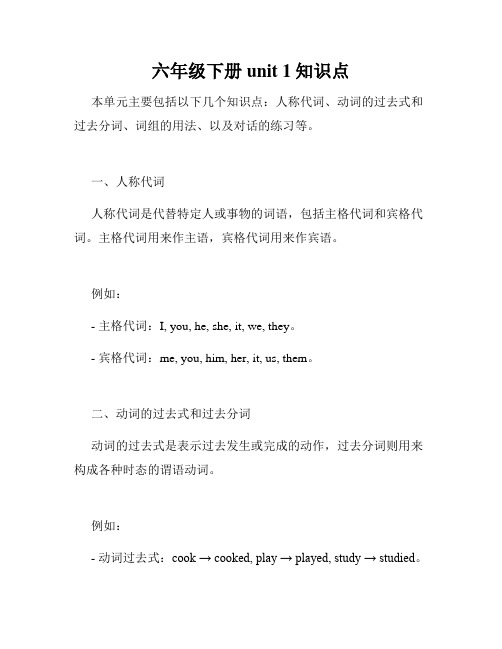
六年级下册unit 1知识点本单元主要包括以下几个知识点:人称代词、动词的过去式和过去分词、词组的用法、以及对话的练习等。
一、人称代词人称代词是代替特定人或事物的词语,包括主格代词和宾格代词。
主格代词用来作主语,宾格代词用来作宾语。
例如:- 主格代词:I, you, he, she, it, we, they。
- 宾格代词:me, you, him, her, it, us, them。
二、动词的过去式和过去分词动词的过去式是表示过去发生或完成的动作,过去分词则用来构成各种时态的谓语动词。
例如:- 动词过去式:cook → cooked, play → played, study → studied。
- 动词过去分词:eat → eaten, sing → sung, go → gone。
三、词组的用法词组是由两个或者更多单词组成的固定搭配,具有特定的意义。
在学习中应掌握一些常用的词组,加深理解和应用。
例如:- go shopping(去购物)- have lunch(吃午饭)- play football(踢足球)- in the morning(在早上)- on the weekend(在周末)四、对话的练习对话是我们和他人交流的重要方式,通过对话可以更好地理解和表达自己的观点。
在学习中,我们可以通过模拟对话的方式进行练习。
例如:- A: What did you do yesterday?(你昨天做了什么?)B: I played basketball with my friends.(我和我的朋友打篮球了。
)- A: Where did you go on your vacation?(你假期去了哪里?) B: I went to the beach.(我去了海滩。
)以上就是六年级下册unit 1的知识点总结。
通过学习这些知识点,我们能够更好地掌握人称代词、动词的过去式和过去分词的用法,能够正确地运用各种词组表达自己的意思,并且能够进行日常对话。
六年级英语下册Unit1知识点总结

人教PEP版英语六年级下册各单元知识点Unit 1 How tall are you ?一、必背单词(形容词的比较级)①一般形容词→词尾+ertall ——taller 高的更高的short ——shorter 矮的/短的更矮的/更短的long ——longer 长的更长的strong——stronger 强壮的更强壮的old ——older 老的/旧的更老的/更旧的young——younger 年轻的更年轻的small ——smaller 小的更小的low ——lower 低地更低地smart——smarter 聪明的更聪明的②以e结尾的形容词→词尾+rlarge ——larger 大的更大的late ——later 晚的更晚的simple ——simpler 简单的更简单的safe ——safer 舒服的更舒服的③以重读闭音节结尾,辅+元+辅→双写最后一个辅音字母+erbig——bigger 大的更大的thin——thinner 瘦的更瘦的fat——fatter 胖的更胖的sad ——sadder难过的更难过的hot——hotter 热的更热的wet——wetter 潮湿的更潮湿的④辅音字母+y 结尾→改y 为i +erhappy——happier 开心的更开心的heavy——heavier 重的更重的funny——funnier 滑稽的更滑稽的angry——angrier 生气的更生气的sunny——sunnier 天晴的更晴朗的windy——windier 有风的的更有风的busy——busier 忙的更忙的early——earlier 提早的更早的⑤其它双音节和多音节词皆在前面→加单词more。
careful——more careful difficult——more difficult delicious——more delicious不规则变化:原级比较级good/well betterbad worsemany/much morelittle lessfar farther/further注:有些形容词一般没有比较等级。
小学英语六年级下册第一单元知识点总结

your是形容词性物主代词,后面必须修饰名词;而yours多了 一个s,相当于your+s,所以yours后面不在加名词。
即:yours= your+s
判断题 My hands are bigger than your. My hands are bigger than you. 因此上面那句话还可以写为: My hands are bigger than your hands.
big heavy long thin small
bigger heavier longer thinner smaller
feet 脚(复数) size 号码,尺码 wear 穿
形容词 原级
heavy heavy 重的
long thin
long 长的
thin 瘦的
big big 大的
small small 小的
小学英语六年级下册第一单元知识 点总结
形容词 原级
比较级
最高级
tall tall 高的
taller 更高的
tallest 最高的
short short 矮的
shorter 更矮的
shortest 最矮的
strong stronger strongest strong 强壮的 weaker 最强壮的
多音节 词和部 分双音 节词
以字母e结尾的词加r或者 st
末尾只有一个辅音字母 的重读闭音节词,应双 写这个辅音字母,再加
er或者est(辅元辅)
以辅音字母加y结尾的双 音节词,先变y为i再加er 或者est
fine late
big thin fat
六年级英语下Unit1知识点梳理

第一单元知识点梳理短语:1.多高how tall2.我们两个加起来both of us together3.在那边over there4.那么大那么高so big and tall5.多大how old6.看一看have a look7.多大码what size 8.橱窗里的那些鞋子those shoes in the window 9.在中国in China 10. 40码的鞋size 40 shoes 11.多重how heavy 12.变得越来越低get lower and lower 13. 落下go down 14. 长得更老grow older 15.长得更高grow taller单词young—younger更年轻的old -older更年长的tall- taller更高的short-shorter更矮的long-longer更长的thin-thinner更瘦的heavy-heavier更重的big-bigger更大的small -smaller更小的strong -stronger更强壮的句子1. That's the tallest dinosaur in this hall. 那是这个厅里最高的恐龙。
2. You're older than me.你比我大。
3. How tall are you?你有多高?I'm 1.65 meters.我身高1.65米。
4. What size are your shoes?你穿多大号的鞋。
My shoes are size37.我穿37号的鞋。
5. Your feet are bigger than mine.你的脚比我的大。
6. How heavy are you?你有多重?I'm 48 kilograms.我体重48公斤。
7. It’s taller than both of us together. 它比我俩加起来还高。
六年级下册英语第一单元总结
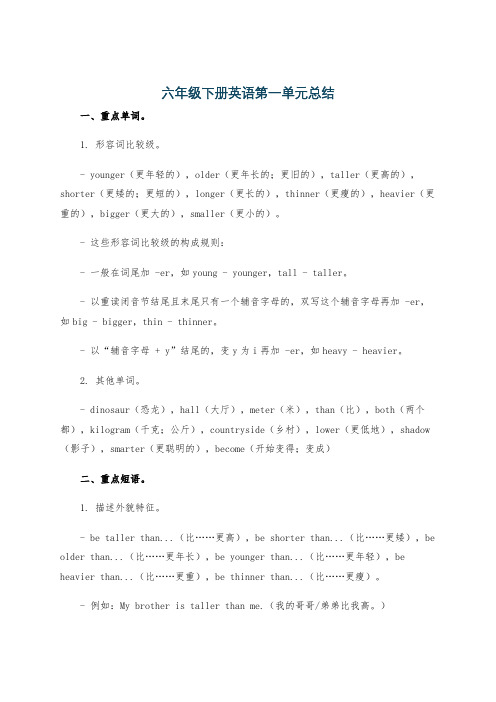
六年级下册英语第一单元总结一、重点单词。
1. 形容词比较级。
- younger(更年轻的),older(更年长的;更旧的),taller(更高的),shorter(更矮的;更短的),longer(更长的),thinner(更瘦的),heavier(更重的),bigger(更大的),smaller(更小的)。
- 这些形容词比较级的构成规则:- 一般在词尾加 -er,如young - younger,tall - taller。
- 以重读闭音节结尾且末尾只有一个辅音字母的,双写这个辅音字母再加 -er,如big - bigger,thin - thinner。
- 以“辅音字母 + y”结尾的,变y为i再加 -er,如heavy - heavier。
2. 其他单词。
- dinosaur(恐龙),hall(大厅),meter(米),than(比),both(两个都),kilogram(千克;公斤),countryside(乡村),lower(更低地),shadow (影子),smarter(更聪明的),become(开始变得;变成)二、重点短语。
1. 描述外貌特征。
- be taller than...(比……更高),be shorter than...(比……更矮),be older than...(比……更年长),be younger than...(比……更年轻),be heavier than...(比……更重),be thinner than...(比……更瘦)。
- 例如:My brother is taller than me.(我的哥哥/弟弟比我高。
)2. 地点短语。
- in the countryside(在乡村),in the hall(在大厅里)三、重点句型。
1. 比较级句型。
- A+be动词+比较级+than + B.(A比B更……)- 例如:The giraffe is taller than the deer.(长颈鹿比鹿更高。
六年级下册英语第一单元笔记

六年级下册英语第一单元笔记一、单元主题与核心词汇本单元主题为“学校生活”,主要围绕学校日常活动、课程、课外活动等内容展开。
核心词汇包括学科名称(如math, science, English等)、学校设施(如library, playground 等)、学校日常活动(如have classes, do homework等)以及相关的动词和形容词。
二、重点句型和语法结构一般现在时第三人称单数形式结构:主语(第三人称单数)+ 动词第三人称单数形式(+ 其他)用法:描述经常性、习惯性的动作或状态。
动词变化规则:一般在动词后加-s或-es;以ch, sh, s, x, o 结尾的动词加-es;以辅音字母+y结尾的动词,变y为i再加-es。
举例:She usually reads books after dinner.He watches TV every evening.My brother studies hard at school.询问和回答日常活动询问句型:What do you usually do after school?回答句型:I usually [动词原形] after school.举例:Q: What do you usually do after school?A: I usually play football with my friends.描述课程与活动喜好结构:I like [学科/活动] because [原因].举例:I like English because it's interesting.My sister loves PE class because she can play sports.三、重点词汇及短语学科名称Math 数学Science 科学English 英语Chinese 语文PE 体育Art 美术Music 音乐学校设施Library 图书馆Playground 操场Classroom 教室Gym 体育馆Laboratory 实验室日常活动Have classes 上课Do homework 做作业Play sports 进行体育运动Read books 读书Watch TV 看电视其他常用词汇Fun 有趣的Difficult 困难的Favorite 最喜欢的Enjoy 喜欢Interesting 有趣的Bored 无聊的四、扩展内容与练习题1. 扩展内容学习更多关于学校生活的词汇和表达,如学校规则、课外活动、同学关系等。
英语课堂笔记六年级下册
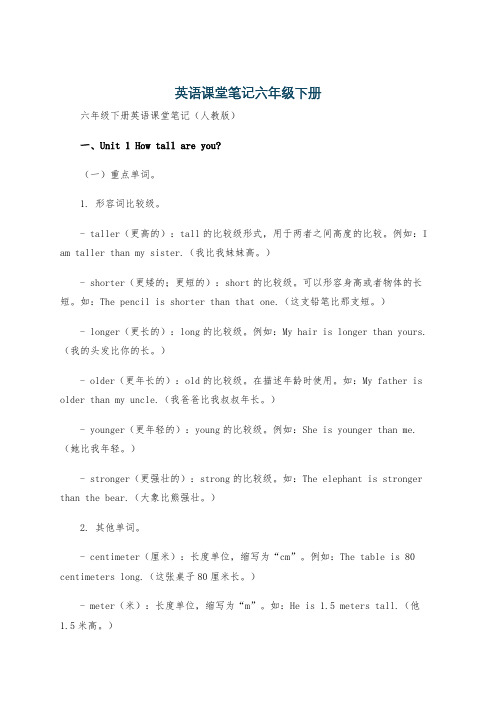
英语课堂笔记六年级下册六年级下册英语课堂笔记(人教版)一、Unit 1 How tall are you?(一)重点单词。
1. 形容词比较级。
- taller(更高的):tall的比较级形式,用于两者之间高度的比较。
例如:I am taller than my sister.(我比我妹妹高。
)- shorter(更矮的;更短的):short的比较级。
可以形容身高或者物体的长短。
如:The pencil is shorter than that one.(这支铅笔比那支短。
)- longer(更长的):long的比较级。
例如:My hair is longer than yours.(我的头发比你的长。
)- older(更年长的):old的比较级。
在描述年龄时使用。
如:My father is older than my uncle.(我爸爸比我叔叔年长。
)- younger(更年轻的):young的比较级。
例如:She is younger than me.(她比我年轻。
)- stronger(更强壮的):strong的比较级。
如:The elephant is stronger than the bear.(大象比熊强壮。
)2. 其他单词。
- centimeter(厘米):长度单位,缩写为“cm”。
例如:The table is 80 centimeters long.(这张桌子80厘米长。
)- meter(米):长度单位,缩写为“m”。
如:He is 1.5 meters tall.(他1.5米高。
)- kilogram(千克;公斤):重量单位,缩写为“kg”。
例如:The bag is 5 kilograms heavy.(这个包5公斤重。
)(二)重点句型。
1. 询问身高。
- How tall are you?(你有多高?)- I'm 1.65 meters tall.(我1.65米高。
六年级下册英语第一二单元知识点
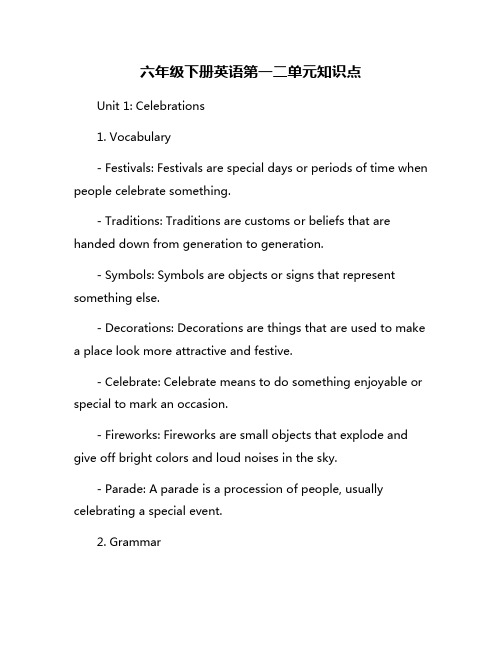
六年级下册英语第一二单元知识点Unit 1: Celebrations1. Vocabulary- Festivals: Festivals are special days or periods of time when people celebrate something.- Traditions: Traditions are customs or beliefs that are handed down from generation to generation.- Symbols: Symbols are objects or signs that represent something else.- Decorations: Decorations are things that are used to make a place look more attractive and festive.- Celebrate: Celebrate means to do something enjoyable or special to mark an occasion.- Fireworks: Fireworks are small objects that explode and give off bright colors and loud noises in the sky.- Parade: A parade is a procession of people, usually celebrating a special event.2. Grammar- Present simple tense: We use the present simple tense to talk about general truths, habits, and routines.- Adverbs of frequency: Adverbs of frequency tell us how often something happens. Some examples are always, usually, often, sometimes, and never.3. Reading and Writing- Reading comprehension: Reading comprehension is the ability to understand and interpret a text.- Writing a diary entry: A diary entry is a personal record of daily events and experiences.Unit 2: Nature1. Vocabulary- Habitat: A habitat is the natural environment where an animal, plant, or organism lives.- Endangered: If a species is endangered, it is at risk of becoming extinct.- Eco-friendly: Eco-friendly means not harmful to the environment.- Pollution: Pollution is the presence of harmful substances in the environment.- Extinct: Extinct means that a species no longer exists.- Conservation: Conservation is the protection and preservation of natural resources.2. Grammar- Modal verbs: Modal verbs are auxiliary verbs that express possibility, necessity, ability, permission, or obligation.- Comparatives and superlatives: Comparatives are used to compare two things, while superlatives are used to compare three or more things.3. Reading and Writing- Descriptive writing: Descriptive writing describes a person, place, or thing in detail.- Writing a persuasive text: Persuasive writing aims to convince the reader of a certain point of view or a call to action.In summary, the first two units of the sixth-grade English textbook cover vocabulary related to celebrations and nature, as well as grammar points such as the present simple tense, adverbs of frequency, modal verbs, and comparatives andsuperlatives. Students also practice reading comprehension, writing diary entries, descriptive writing, and persuasive texts.。
部编本六年级下册英语第一单元知识点归纳

部编本六年级下册英语第一单元知识点归纳本文档将归纳部编本六年级下册英语第一单元的重要知识点。
以下是本单元的知识点总结:1. 基本问候语在第一单元中,我们研究了一些基本的英语问候语,如:- Hello!(你好!)- Hi!(嗨!)- How are you?(你好吗?)- I'm fine, thank you.(我很好,谢谢。
)- What's your name?(你叫什么名字?)掌握这些基本的问候语有助于我们与他人进行简单的交流。
2. 介绍自己在第一单元中,我们还研究了如何介绍自己。
例如,我们可以用以下句子来介绍自己:- My name is [name].(我的名字叫[name]。
)- I'm [age] years old.(我[age]岁。
)- I'm from [place].(我来自[地方]。
)通过介绍自己,我们可以更好地与他人建立联系并展开对话。
3. 询问他人信息在第一单元的研究中,我们还学会了如何询问他人的信息。
例如,我们可以使用以下句子来询问他人的名字、年龄等:- What's your name?(你叫什么名字?)- How old are you?(你几岁了?)- Where are you from?(你来自哪里?)熟练掌握这些句子可以帮助我们主动获取他人的信息。
4. 词汇与句型除了以上的基本知识点外,第一单元还包含了一些词汇和常用句型。
在研究中,我们应该重点掌握以下内容:- 常见的家庭成员词汇,如father(父亲)、mother(母亲)、brother(兄弟)等。
- 一些形容词的用法,如big(大的)、small(小的)、happy (快乐的)等。
- 一些简单的句型,如She is my sister.(她是我的姐姐。
)、He is ten years old.(他十岁。
)等。
通过研究这些词汇和句型,我们能够更准确地表达自己的意思。
六年级英语下册第一单元知识点
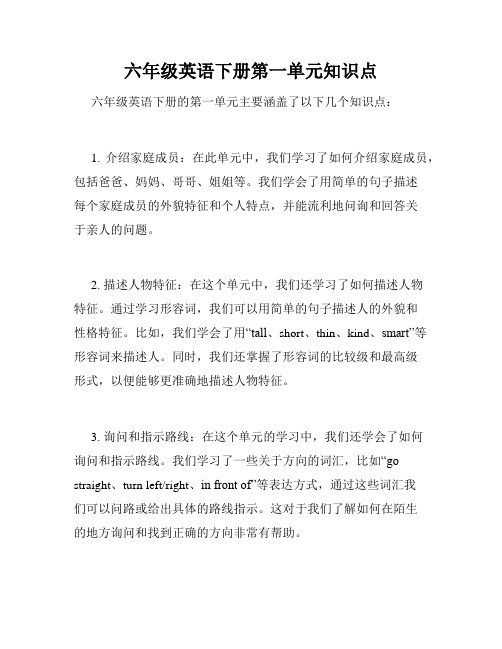
六年级英语下册第一单元知识点六年级英语下册的第一单元主要涵盖了以下几个知识点:1. 介绍家庭成员:在此单元中,我们学习了如何介绍家庭成员,包括爸爸、妈妈、哥哥、姐姐等。
我们学会了用简单的句子描述每个家庭成员的外貌特征和个人特点,并能流利地问询和回答关于亲人的问题。
2. 描述人物特征:在这个单元中,我们还学习了如何描述人物特征。
通过学习形容词,我们可以用简单的句子描述人的外貌和性格特征。
比如,我们学会了用“tall、short、thin、kind、smart”等形容词来描述人。
同时,我们还掌握了形容词的比较级和最高级形式,以便能够更准确地描述人物特征。
3. 询问和指示路线:在这个单元的学习中,我们还学会了如何询问和指示路线。
我们学习了一些关于方向的词汇,比如“go straight、turn left/right、in front of”等表达方式,通过这些词汇我们可以问路或给出具体的路线指示。
这对于我们了解如何在陌生的地方询问和找到正确的方向非常有帮助。
4. 介绍学校设施与科目:在此单元中,我们还学习了如何介绍学校设施和科目。
通过学习相关词汇,我们可以描述学校里的不同设施,如教室、图书馆、游泳池等,并且了解不同科目的名称,如数学、英语、科学等。
这样,我们能够更准确地表达自己对学校设施和科目的看法和喜好。
5. 描述日常活动:在这个单元的学习中,我们还学会了如何描述自己的日常活动。
通过学习时间表达方式和动词短语,我们可以清楚地表达自己每天的行程安排和活动内容。
例如,我们学会了用“get up、have breakfast、go to school、do homework”等动词短语来描述我们每天的日常活动。
通过六年级英语下册第一单元的学习,我们扩大了自己的词汇量,提高了描述、交流和表达的能力,同时也了解了更多关于家庭、人物特征、路线、学校和日常活动等方面的知识。
这些知识将在我们的英语学习中起到重要的基础作用,帮助我们更好地与他人沟通交流,并能够更加自信地运用英语进行表达。
六年级下册第一单元英语知识点

Unit 1: English Knowledge Points for Grade 6Vocabulary:New words related to daily life, school, and hobbies.Phrases and expressions commonly used in conversations.Grammar:Simple present tense: used to describe habitual actions or general truths. Basic sentence structure: subject + verb + Object (SVO).Listening and Speaking:Understanding and responding to questions about daily activities, school life, and hobbies.Asking and answering questions using "What?", "Where?", "When?", "Who?", and "How?"Reading and Writing:Reading comprehension skills to understand short texts and answer questions. Writing basic sentences and paragraphs about daily life, school, and hobbies.Cultural Understanding:Learning about different cultures and customs through language.词汇:与日常生活、学校生活和兴趣爱好相关的新词汇。
六年级下英语第一单元知识点
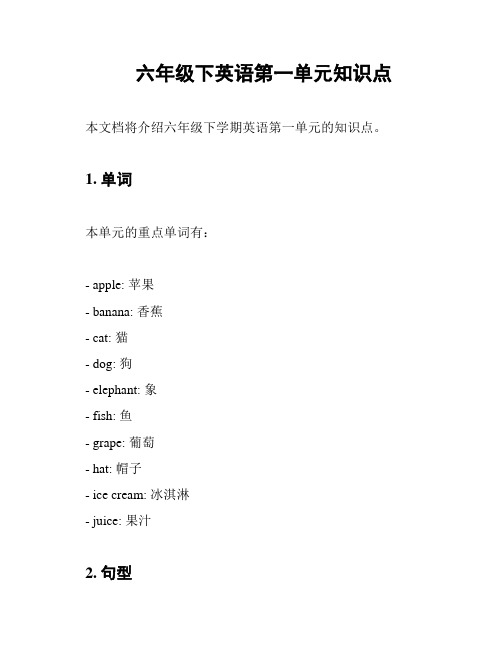
六年级下英语第一单元知识点本文档将介绍六年级下学期英语第一单元的知识点。
1. 单词
本单元的重点单词有:
- apple: 苹果
- banana: 香蕉
- cat: 猫
- dog: 狗
- elephant: 象
- fish: 鱼
- grape: 葡萄
- hat: 帽子
- ice cream: 冰淇淋
- juice: 果汁
2. 句型
本单元的句型有:
- I have an apple. (我有一个苹果。
)
- Do you have a dog? (你有一只狗吗?)
- He has a cat. (他有一只猫。
)
- She doesn't have a hat. (她没有帽子。
)
- They have two bananas. (他们有两个香蕉。
)
3. 能力训练
本单元的能力训练包括:
- 听力练:听录音,按要求选择正确的单词或句子。
- 口语练:使用学到的句型进行对话练。
- 阅读练:阅读短文,回答相关问题。
- 写作训练:根据提示写一篇关于你喜欢的水果的短文。
4. 附加资源
为了帮助学生更好地研究本单元内容,可以参考以下附加资源:
- 相关练册:完成课后题来巩固所学知识。
- 在线练:通过在线研究平台进行自主研究和练。
以上是六年级下英语第一单元的知识点介绍,希望对学生们的
研究有所帮助。
- 1、下载文档前请自行甄别文档内容的完整性,平台不提供额外的编辑、内容补充、找答案等附加服务。
- 2、"仅部分预览"的文档,不可在线预览部分如存在完整性等问题,可反馈申请退款(可完整预览的文档不适用该条件!)。
- 3、如文档侵犯您的权益,请联系客服反馈,我们会尽快为您处理(人工客服工作时间:9:00-18:30)。
8
You look so happy.
你看上去很高兴。
9
My nose hutrs.
我的鼻子疼。
9
How are you, Sarah ?
你怎么了Sarah?
10
feel sick
感觉不舒服
10
You look sad today.
你今天看上去很伤心。
11
in the winter
在冬天
11
going on a big trip
长途旅行
12
get the flu
得了流感
12
I’m sorry to hear that.
听到这件事我很难过。
13
have the flu
得了流感
13
fail the math test
数学考试不及格
14
Don’t worry!
别担心!
14
weather
天气
hear that.
4、She is between
Zhang Peng ____
Sarah.
5、Pass the ball__
me.
6、The ball bounces
__ his head.
7、They arhurt
疼痛
2
angry
生气的
3
have a cold
感冒
3
excited
飞到;飞进
25
another goal
又一分
自我评价:A☆☆☆☆☆B☆☆☆☆☆
/aɪ/ pine松树
bike自行车type形式dive跳水
/ɔɪ/ point点
boy男孩toy玩具doyen前辈
连线
How heavy are you ? I wear size 17.
How big are your feet ? I’m47kg.
How long are your legs?I’m 165 cm.
/aʊ/1、字母组合ou的发音:count数数;house别墅;south南方;arouse鼓励;younger更年轻的;bounce反弹。2、字母组合ow发音:how怎么、如何;now现在;flower花。
22
win the game
赢得比赛
23
laughing at
因……而发笑
24
fly into
2、My hands are bigger than __.
3、I'm stronger than __.
4、How __ are your legs?
5、How __ are your feet?
常用字母组合:
er一般用在单词末尾,发音为/ə/,常用单词有本单元各比较级单词,fever,matter等。相似发音字母组合还有ir和ur。
自我评价:A☆☆☆☆☆B☆☆☆☆☆
第二单元知识归纳
☆
☆☆
☆☆☆
A部分
☆
☆☆
☆☆☆
B部分
选择:
1、How ___ you
feel ?
2、What’s the
matter ___ you?
3、My nose ____.
4、I feel sick ___
the winter.
5、Stay __ bed ___
15
see the doctor
看医生
laughing ___
John’s funny goal.
A to B on
C and D off
E does F at
15
a football match
一场足球赛
16
take some medicine
吃一些药
17
between…and
在……之间
17
drink hot drinks
兴奋的
4
have a toothache
牙痛
4
happy
高兴的
5
have a headache
头疼
5
sad
伤心的
6
have a sore throat
嗓子疼
6
bored
无聊的
7
What’s the matter?
怎么了?
7
How are you, Liu Yun ?
你怎么了,刘芸?
8
Mythroatis sore.
你多高?
6
How heavy are you?
你多重?
7
I’m164 cmtall.
我身高164厘米。
7
I’m48 kg.
我体重48千克。
8
You’re shorter than me.
你比我矮。
8
I’m thinner than you, and shorter.
我比你瘦而且矮。
9
You’re4 cmtaller than me.
a few days.
6、You will feel
___ soon.
A in
B do
C for
D better
E with
F hurts
G does
H hurt
1
have a fever
发烧
1、How ___ she
feel ?
2、I’m going __
a big trip.
3、I’m sorry __
How old are you ? My legs are76cm
How tall are you?I’m 13 years old.
13
good swimmer
游泳健将
14
jump out of water
跳出水面
选择。A.bigB.longC.tallerD.yours E.you
1、You're 5 cm __ than me.
第一单元知识归纳
☆
☆☆
☆☆☆
A部分
☆
☆☆
☆☆☆
B部分
1
taller
更高的
1
heavier
更重的
2
stronger
更强壮的
2
thinner
更瘦的
3
older
更年长的
3
longer
更长的
4
younger
更年轻的
4
bigger
更大的
5
shorter
更矮(短)的
5
smaller
更小的
6
How tall are you?
你比我高4厘米。
10
line up
排队
9
teeth (单数:tooth)
牙齿复数
11
from…to
从……到
10
each
每个
12
funnier
更有趣的
11
up to
达到
12
dive in to deep cold water
潜入深冷的水里
本单元语音词汇:
/eɪ/ pain惩罚
tail尾巴baby婴儿day天
喝热饮
18
pass…to
把……传给
18
stay in bed
卧床休息
19
kick the ball
踢球
19
a few days
几天
20
a little
一点
20
feel better(good比较级)
感觉好一些
21
bounces off
从……弹出
语音:/əʊ/1、字母组合oa发音:coat大衣;load装载;soap肥皂;throat喉咙;boat小船;goal得分2、字母组合ow发音:know知道;row划船;3、字母o名称音:rose玫瑰;hole洞;go去;nose鼻子;
